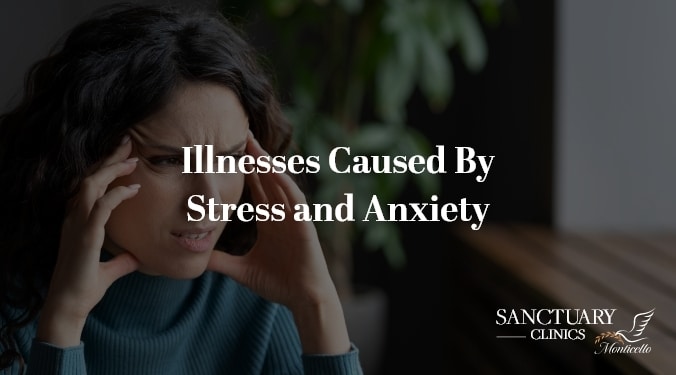A mood swing is an abrupt change of emotion. Mood swings can be disruptive to your life, cause you to feel low moods, and cause you to feel like your mood is going up and down. You may be unable to determine why you feel like you do. When they become severe, they can be considered a symptom of a mental illness.
Causes of Mood Swings
Mood swings can be caused by a wide number of contributing factors related to diet, medication, and medical issues. Some of the elements which can cause mood swings are:
- A significant life change
- Low blood sugar or eating too much sugar
- Insomnia
- Medications
- Stress
- Not eating a healthy diet
- Hormones
- PMS, pregnancy, or menopause
- Caffeine
- Depression
- Thyroid issues
- ADHD
- More severe issues such as dementia or bipolar disorder
- Alcohol
- Substance abuse
- Seasonal changes
Are you or someone you love experiencing more severe or longer lasting mood swings? We can help. Sanctuary Clinics successfully treats hundreds of patients for mood disorders every year.
Get Help Today.
We are here to help you through every aspect of recovery.
Let us call you to learn more about our treatment options.
We are here to help you through every aspect of recovery. Let us call you to learn more about our treatment options.
Mood Swing Symptoms
Mood swings are a natural part of life, especially when you are worried or stressed. When they do happen, you may feel on top of the world one moment, and feel incredibly sad the next, without understanding why this has happened. Mood swings can also disrupt your sleep, activeness, and attitude. If they are prolonged for more than two weeks, they can be a sign of a more serious mental concern such as bipolar disorder.
Mood Swing Management
The very first thing you should do is talk with your doctor to see what he/she recommends. If your doctor finds nothing wrong with you physically, they might recommend therapy. Therapy will help you sort out the emotions you are having during mood swings. It will give you tools like coping skills for emotional management which can help you. Other things you can do to manage your mood swings are:
- Eat healthy and exercise
- Make sure you get enough sleep
- Meditate or do yoga
- Avoid alcohol and caffeine
- Don’t isolate yourself. Keep connected to friends.
- Aromatherapy
- Visualization technique
- Keep a journal to record your mood swings and what could have triggered them. Also log your sleep, exercise, and your diet.
Sanctuary Clinics brings together the very latest in neuroscience, medical interventions, evidence-based therapies and the power and love of Jesus Christ in treating mood disorders. Don’t let your moods control you.
Get Help Today.
We are here to help you through every aspect of recovery.
Let us call you to learn more about our treatment options.
We are here to help you through every aspect of recovery. Let us call you to learn more about our treatment options.
Brain Chemistry Effect on Mood Swings
Our brain releases neurotransmitters and hormones. They send messages to other areas of our brain which affects our emotions. An imbalance is caused by making too little or too much of one of your neurotransmitters or hormones.
There are four chemicals which affect our mood: serotonin, dopamine, oxytocin, and endorphins. Serotonin affects depression, sleep, appetite, arousal, balances mood, and gives feelings of well-being. Dopamine affects cognition, emotion, behavior, happiness, and pleasure. Oxytocin promotes social interaction. Endorphins help you with stress. An imbalance of any of these can lead to a mood disorder.
Treatment for Mood Swing Disorders
First, it is important to determine what is causing them. If it is a temporary situation, the mood swings will most likely pass once the period of stress is over. If it is not a temporary situation, there are a few avenues of treatment.
- Medication – antidepressants, mood stabilizers, or antipsychotics
- Lifestyle changes – regular sleep, regular exercise, a healthy diet, and journaling your mood swings and triggers
- Psychotherapy (talk therapy) – Cognitive behavioral therapy (CBT), Dialectical behavioral therapy (DBT), Psychodynamic therapy
- Other therapies – Electroconvulsive therapy (ECT), Transcranial magnetic stimulation (TMS), and light therapy for seasonal affective disorder (SAD)
Sanctuary Clinics offers the very latest in evidence-based treatments and therapies, in a community setting, immersed in a Christ-centered community of love and encouragement. Don’t walk this road alone. Call NOW!
Mood Swing FAQs
Where to get help for mood swing disorders?
The first thing you should do is talk with your primary care physician and see what they can do to help you. They may refer you to a mental health provider. The mental health provider may provide therapy and/or medications, or they can determine if your symptoms are severe enough that a specialized treatment center is necessary for you.
When you stay at a treatment center, you have access to the treatments listed above while you are living in a serene and stable environment. You will also have access to support groups, counseling, medication recommendations, alternative therapies, and mental health education.
With the correct kind of treatment, you will be able to self-regulate your symptoms and regain control of your life.
Are mood swings a mental disorder?
While moods swings can be a normal part of life, extreme and prolonged swings can be a sign of mental disorders such as bipolar disorder, schizoaffective disorder, or personality disorder.
What mental illness causes sudden mood swings?
The mental illnesses which can cause sudden mood swings are bipolar disorder, schizoaffective disorder, personality disorder, depression, and cyclothymic disorder.
How long do mood swings last?
If you are experiencing a mood swing which lasts a few hours or up to a day, this is probably a normal mood swing. If you have one that lasts days, weeks, or months, this is a sign of a deeper mental health issue, and you should seek out treatment.
Get Help Today.
We are here to help you through every aspect of recovery.
Let us call you to learn more about our treatment options.
We are here to help you through every aspect of recovery. Let us call you to learn more about our treatment options.









